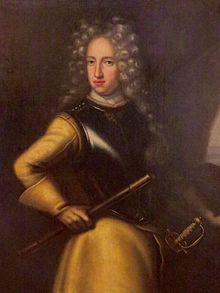This article has multiple issues. Please help improve it or discuss these issues on the talk page. (Learn how and when to remove these messages)
|
| Frederick IV | |
|---|---|
 Frederick IV, Duke of Holstein-Gottorp | |
| Duke of Holstein-Gottorp | |
| Reign | 6 January 1695 – 19 July 1702 |
| Predecessor | Christian Albert |
| Successor | Charles Frederick |
| Born | 18 October 1671 Gottorf Castle |
| Died | 19 July 1702 (aged 30) Battle of Kliszów |
| Burial | |
| Spouse | |
| Issue | Charles Frederick, Duke of Holstein-Gottorp |
| House | Holstein-Gottorp |
| Father | Christian Albert, Duke of Holstein-Gottorp |
| Mother | Princess Frederica Amalia of Denmark |
Frederick IV (18 October 1671 – 19 July 1702) was the reigning Duke of Holstein-Gottorp.
He was born in Gottorf Castle as the elder son of Duke Christian Albert of Holstein-Gottorp and Princess Frederica Amalia of Denmark. He was married on 12 May 1698 to Princess Hedwig Sophia of Sweden and they had an only child, Charles Frederick, who eventually fathered the future Tsar Peter III of Russia, therefore making Frederick a patrilineal ancestor to all Russian emperors after Catherine II.
He took part in the Great Northern War and was killed by artillery fire in the Battle of Kliszów in Poland.
According to Robert Massie's Peter the Great: His Life and World, Duke Frederick arrived in Stockholm to marry his cousin, Princess Hedwig Sophia, soon befriending his first cousin and new brother-in-law, King Charles XII (their respective mothers, Frederica Amalia and Ulrika Eleonora, being daughters of Frederick III of Denmark).[1] His visit made such an impression on Swedish society that the excesses surrounding him and the King earned him "the Gottorp Fury" as a nickname. Duke Frederick and King Charles regularly participated in wild festivities, drinking binges, and outlandish pranks. Generally, Duke Frederick's influence was the blame for the King's "reckless" lifestyle. There were even rumors at the time that the Duke sought to kill the King and usurp the throne. As it happened, according to Massie in the aforementioned book, the 17-year-old King Charles, in the summer of 1699, pushed himself to an unbearable point of excess and vowed never to touch another drop of liquor again. Apparently, writes Massie, the King stuck to beer thereafter, and even just drank beer when he was either wounded or post-battle. As for his relationship with his cousin Frederick, they remained on good terms, so much that King Charles gave him military assistance to defend Holstein-Gottorp from Danish invasion.
- ^ Huberty, Michel; Giraud, Alain; Maagdelaine, F. et B. (1994). L'Allemagne Dynastique, Tome VII Oldenbourg. France: Laballery. pp. 50–51, 75–76. ISBN 2-901138-07-1.